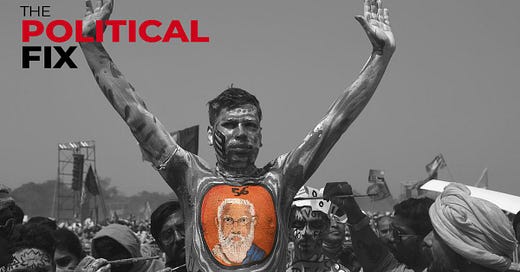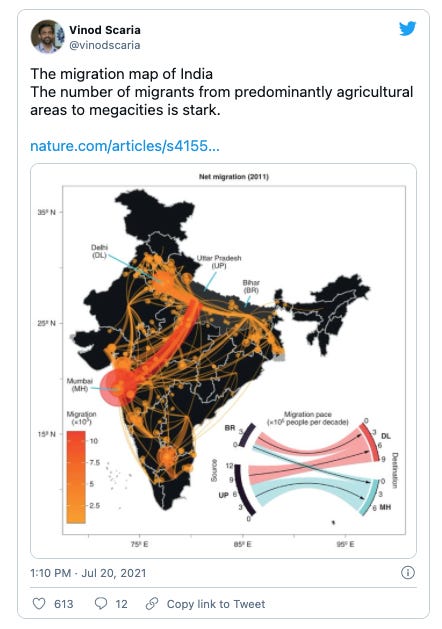The Political Fix: Pegasus, electoral bonds and tax raids offer a clearer view why BJP is dominant
A newsletter on politics and policy from Scroll.in.
Welcome to The Political Fix by Rohan Venkataramakrishnan, a newsletter on Indian politics and policy. To get it in your inbox every week, sign up here.
Request: Our small team wants to cover the big issues. That is why we are appealing for contributions to our Ground Reporting Fund. If you’d like to assist our effort, click here.
The Big Story: Trojan horse
The current era of Indian politics has been referred to as the fourth party system. This means that it is a break from the three distinct phases that came before 2014. These were the dominant Congress era (1952-1967), the Congress decline phase (1967-1989) and the coalition era (1989-2014). This new phase is easily summarised: the dominant Bharatiya Janta Party “has emerged as a system-defining party, in response to which all others position themselves”.
Powered by the charisma and popular appeal of Prime Minister Narendra Modi, a sharp focus on welfare delivery and the party’s success in selling its Hindutva ideology to a large, pan-Hindu social coalition primarily by demonising Muslims, the BJP has achieved tremendous success at the national level, while also expanding its base well beyond the Hindi belt it was once confined to.
The BJP has struggled to turn this into enduring success at the state level, arguably because it has invested so much in a centralised welfare model. But, on the national stage, in part because of the many current weaknesses of the Opposition, it appears not just dominant but almost unassailable. Despite the economic downturn and the government’s disastrous handling of the Covid-19 crisis, the refrain remains “aayega to Modi hi” (ultimately, Modi alone will win).
The political aspects of the party’s success, including the relentless focus on narrative building, have been thoroughly discussed. Of course, not everyone is in agreement about how much of this can be attributed to anti-Muslim Hindu majoritarian impulses and how much to voters rewarding Modi for welfare schemes and low inflation.
Uneven field
But there are other important pieces to this puzzle, many of which involve the BJP-led government’s efforts to entrench its position as the dominant pole of Indian politics. These are as relevant to note when seeking to understand the workings of this fourth party system.
We discussed some of these earlier this year, pointing out the lack of a level playing field for the BJP compared to other parties. This is thanks to things like the opaque system of political funding called electoral bonds, which was designed to heavily favour the party in power.
Also playing a part are changes to rules regarding online speech and digital news, which emerged after ministers discussed ways to neutralise independent media organisations that dared to question the government.
Modi’s relentless centralising has extended to the business world, where his government prefers a few national champions – naturally with cosy relationships to his party – over the messy “Andhrapreneur” set-up.
There is also the wielding of state institutions (such as investigation agencies) to ensure political outcomes. Many have questioned how independent some constitutional authorities, like the Supreme Court and the Election Commission actually are.
Just last week, a massive news organisation that had distinguished itself with honest coverage of the disastrous state mishandling during the Covid-19 second wave earlier this year, was raided by tax authorities.
Which brings us to Pegasus.
Over the last week, a consortium of 17 media organisations working with French non-governmental body Forbidden Stories and Amnesty International revealed a leaked list of potential targets of governments all over the world allegedly relying on extremely invasive spyware built by the Israel-based NSO Group. Read the Wire’s complete coverage of the Pegasus leaks, including the alleged targeting of numerous Indian journalists, activists, politicians one former Election Commision officer and one sitting judge, here.
The Pegasus revelations are, in a way, a response to the mutterings that the BJP’s abuse of state institutions is no different from Indian governments in the past. That previous dispensations have sought to wield such power may indeed be true.
State excesses
But the combination of a brute majority-powered government and the advent of technological tools that offer scale and unprecedented access into people’s lives make it evident that the BJP is happy to go further than the worst state excesses of the past. And that is without even mentioning the alleged use of hackers to actually plant fake incriminating evidence on activists that the government has sought to portray as anti-national.
As lawyer Vrinda Bhandari explained,
“This is not just a case of traditional surveillance or phone tracking. We’re talking about malware and spyware that can look at all the contents of your phone and take control of it, through “zero click” attacks (ie without any action by the user). This is not surveillance in the traditional sense, this is hacking.
And that’s why I think we should be worried for three reasons:
The undemocratic use.
The unprecedented magnitude.
The unreasonable invasion into privacy.
The undemocratic use is because this is done without any transparency, without any accountability, without any or legal backing. The unprecedented magnitude is just the sheer number of people reportedly on these lists, whether you’re talking about Gangandeep Kang, a famous biologist, to journalists to activists to a sitting judge. The unreasonable invasion is because this is hacking, not just surveillance”
There is an important caveat here.
The NSO Group claims that it only sells to “vetted” governments after getting a clearance from the Israel defence ministry. From the Pegasus leaks themselves, we cannot tell whether the government that was using the spyware was India’s. Yet, the evidence seems to point in that direction.
As the Guardian reported, “The selection of Indian numbers largely commenced around the time of Modi’s 2017 trip to Israel, the first visit to the country by an Indian prime minister and a marker of the burgeoning relationship between the two states, including billions of dollars in deals between Delhi and Israeli defence industries.”
Moreover, India’s government has not denied buying Pegasus or using it against its own citizens. Sure, there have been the usual angry shouts of “anti-national” and “conspiracy to target India” thrown at what is clearly a global story. But, as I wrote last week, a careful reading of all the government statements so far make it very clear that the authorities have no intention of saying the phrase, “India did not use Pegasus spyware”.
We also don’t know which Indian government may be using the spyware, though given what we know it seems unlikely that a state would be wielding such a dangerous cyberweapon, without the Centre’s approval, or indeed, encouragement.
Danger to democracy
Assuming that it is the Centre, then, naturally lays in stark relief what exactly was going on: in the run-up to the 2019 elections, the party in power was spying on activists, journalists, Opposition politicians, a Supreme Court staffer who accused the then Chief Justice of India (and current Rajya Sabha MP nominated by the BJP) of sexual harassment and her family, political players ahead of the BJP’s toppling of a coalition government in Karnataka and an election commissioner who found that Modi had violated the model code of conduct before the general elections.
As Shoaib Daniyal writes,
“To understand the scale of what has happened here, it might be useful to benchmark this with another snooping scandal. In 1974, US President Richard Nixon was forced to resign from office after it emerged that his administration had tried to cover up its role in spying on the main opposition party. With the Supreme Court and Election Commission in the mix along with the Opposition, the allegations around India’s current Pegasus-gate far outstrip Nixon’s Watergate scandal...
Global experts have for some time now raised red flags around the democratic backsliding in India. Most of this involved rising illiberalism, as India’s Union executive seemed to bulldoze all other democratic checks and balances. This latest break, however, raises an even more fundamental question around India’s electoral democracy itself.”
Yet, the news has barely made a mark amid the regular partisan din. This despite the remarkable nature of these revelations, some combination of government brazenness and the complete silence or even muted encouragement from pro-BJP supporters who would otherwise have complained about surveillance. The relatively ineffective Opposition and ordinary Indians appear to be cynically resigned to state intrusion.
There isn’t even the pretence from the government of seeking to investigate and defend the rights of Indian citizens whose rights may have been violated by the use of Pegasus. It has instead decided to falsely claim that the entire story is fake news – even though governments in France, Hungary and elsewhere are actively investigating it.
Whether it leads to domestic political fallout or not, though the Pegasus project is deeply important. For one, it has turned the lens on the worrisome global trade in spyware, used as cyber-weapons, much of it emerging out of Israel.
Closer to home, the revelations also colour in a larger part of the picture when it comes to understanding the nature of BJP dominance in our current era.
Just as one cannot describe the Modi era without referencing the massive financial advantage that the BJP has, in part thanks to electoral bonds, it would also be wrong to discuss the ineffectiveness of the Opposition or the bending of constitutional bodies without mentioning the tactics and tools of the ruling party.
If nothing else, then, the Pegasus revelations offer another glimpse inside the messy workings of the BJP’s electoral and governance machine.
Linking Out
In a world of powerful spying tools, Indian democracy urgently needs checks on intelligence gathering, writes Shoaib Daniyal.
“Journalism is not a bed of roses”: Vijayta Lalwani introduces you to the Jharkhand reporter featured in leaked Pegasus database.
“India has far too often catapulted from one surveillance scandal to another, without fixing the larger problem,” writes Raman Jit Singh Chima. “Rather than a watered down, government-friendly data protection bill as currently before Parliament, what we deserve is a strong privacy code that includes meaningful reform and controls over surveillance.”
Manu Sebastian calls on the Supreme Court to re-open its unusual case looking into the sexual harassment allegations against former Chief Justice Ranjan Gogoi, since “the Pegasus reports, if true, indicate a firm hand-holding between the executive and judicial branches during his term, leaving a stain on the concept of judicial independence.”
Neha Banka explains the “India Out” campaign in the Maldives.
Sanya Dhingra and Nayanima Basu report on the growth and visibility of India’s homegrown thinktanks.
Roshan Kishore looks back at the landmark 1991 Budget and what it meant for the Indian economy.
Can’t make this up
Some tips on learning the wonderful language that is Malayalam:
Thanks for reading the Political Fix. Send feedback to rohan@scroll.in.






